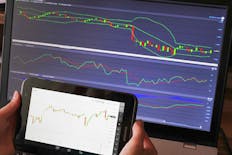Stocks vs CFDs Trading: The Key Differences in 2025
All products and services featured are independently selected by WikiJob. When you register or purchase through links on this page, we may earn a commission.
- A list of the Top Places to Trade Stocks And CFDs for January 2025:
- Description of the Best Places to Trade Stocks And CFDs for January 2025
- Key Differences Between CFDs and Stocks
empty
empty
empty
empty
empty
empty
- Tax Liability
empty
empty
empty
empty
- Stocks vs CFDs Trading: Which Is the Best for You?
- CFDs vs Stocks: Advantages and Disadvantages
empty
empty
- Trading: CFD Example vs Stock Example
empty
empty
- Frequently Asked Questions
- Final Thoughts
Both stocks and CFDs are viable trading options. However, there are key differences between the two investment opportunities.
With CFDs, there is no element of ownership. This is not the case with stocks. The advantage of ownership is the range of shareholder perks and benefits.
Investment in stocks has a long-standing reputation for the potential to earn big returns for those who can navigate the ups and downs of the trading markets.
An investment opportunity that is becoming increasingly popular, however, is the use of CFDs (Contract For Difference).
Where purchasing stocks in a business means that you own that stock, a CFD simply matches the value of a stock or commodity without the element of ownership.
Description of the Best Places to Trade Stocks And CFDs for January 2025
Whether you decide to invest in stocks or CFDs, having a range of places where you can trade them is always useful.
Here are some great options:
1. Plus500
Pros
- No buy/sell commissions and tight spreads
- Leverage of up to 1:30
- FREE unlimited Demo
- 2,800+ trading instruments
- Real-time quotes and advanced analytical tools
- Fast and reliable order execution
Cons
- No API integrations
- No social copy trading
Plus500 is a Israel-based trading provider offering a CFD service only.
Plus500 offers a free app for trading on the go, which provides a demo mode to learn how to trade before you make an actual investment.
Trading with CFDs is suitable only for short-term investments
2. Pepperstone
Pros
- Extensively regulated
- No minimum deposit
- Low fees and mostly free withdrawals
- Good customer service
Cons
- No investor protection for clients outside UK, EU and EEA
- Withdrawal fee for international bank wires
- CFDs only
3. eToro
Pros
- Regulated by FCA, ASIC
- No withdrawal fee for US clients
- 0% commission on stocks
- Social and copy trading
Cons
- Not available in every US State
- More expensive than most of its competitors
- No MetaTrader platforms
Established in 2007, eToro offers both stocks and CFD trading opportunities. They charge 0% commission on stocks trading and, through their patented software CopyTrader, the opportunity to copy the portfolios of top-performing traders.
eToro also features an online community in which you can join discussions with fellow traders and learn more about trading.
To find out more, read our eToro review.
61% of retail investor accounts lose money when trading CFDs with eToro. You should consider whether you understand how CFDs work, and whether you can afford to take the high risk of losing your money.
4. AvaTrade
Pros
- Highly regulated
- Free deposit and withdrawal
- No commission
- Low minimum deposit
- Social and copy trading
Cons
- Not available for US clients
- Inactivity fees
AvaTrade is widely recognized as one of the top places to trade stocks and CFDs (Contracts for Difference).
One of the key strengths of AvaTrade is its strict regulatory compliance. It is regulated by multiple financial authorities globally, providing a secure and reliable trading environment. This regulatory framework ensures that traders’ interests are protected and trading activities are conducted fairly and transparently.
AvaTrade offers a wide variety of trading instruments, including a comprehensive selection of stock CFDs. This diversity allows traders to speculate on the price movements of stocks from major global markets without owning the underlying assets.
AvaTrade provides access to several user-friendly and advanced trading platforms, including MetaTrader 4 and 5, WebTrader, and AvaTradeGo, their proprietary mobile app.
These platforms offer powerful tools and features necessary for effective stock and CFD trading, including advanced charting, analytical tools, and automated trading capabilities.
AvaTrade offers leverage options for trading stocks and CFDs, which can amplify both profits and losses. This feature is attractive for traders looking to maximize their trading capital, but it’s important to understand the risks associated with leverage.
AvaTrade is committed to trader education, providing an extensive library of educational materials, including articles, e-books, webinars, and tutorial videos. These resources are particularly beneficial for beginners and traders looking to enhance their trading knowledge.
The platform is known for offering competitive spreads on stock and CFD trades. Additionally, AvaTrade does not charge commission on trades, which can reduce overall trading costs.
5. XTB
Pros
- Regulated by the FCA
- Low forex fees
- Fast withdrawal and deposit with no fee
- Live chat customer service
Cons
- No US clients
- Limited product portfolio
- High fees for stock CFDs
As a broker that you can trust, XTB is both well-regulated and listed on the stock exchange. The registered office is in Canary Wharf, London.
XTB offers investors and traders the opportunity to trade commodities, stocks, metals, forex, indices and cryptocurrencies, as well as ETFs and CFDs, and it is regulated in top-tier jurisdictions by FCA, CySEC, IFSEC and KNF.
Traders can easily open an account online and can choose between the commission-free Standard account or the Pro account that includes tighter spreads, but there is a commission that needs to be paid on all trades.
Deciding what platform to use to make your trades depends on your location – in most countries, you can choose MetaTrader 4 or the proprietary platform xStation (although MT4 is not available to UK customers).
XTB is a great choice for beginners thanks to the huge range of educational materials, categorized by level (beginner, intermediate and advanced) and the customer service options that are available only on weekdays.
There is a fully functional demo account so beginners can practice strategies and get used to using the platforms.
The more experienced trader will enjoy a huge range of research resources, including trading signals, technical analysis, details about different instruments, and even a heat map and market sentiments.
CFDs are complex instruments and come with a high risk of losing money rapidly due to leverage. 75% of retail investor accounts lose money when trading CFDs with this provider. You should consider whether you understand how CFDs work and whether you can afford to take the high risk of losing your money.
6. IG
Pros
- Highly regulated
- MetaTrader 4 (MT4)
- Over 10,000 instruments
- Available in the UK and US
- 24/7 customer support
Cons
- High fees
- No deposit compensation scheme for US accounts
- No copy trading
- Inactivity fees
IG is a well-known broker offering both stock trading and CFD (Contract for Difference) trading:
- Stock Trading: IG provides access to a wide range of stocks from various global markets. Investors can buy and sell shares of companies, giving them ownership of the underlying assets.
- CFD Trading: In addition to traditional stock trading, IG offers CFD trading, allowing traders to speculate on the price movement of stocks (and other assets like forex, indices, commodities, and cryptocurrencies) without owning the actual assets. CFDs provide opportunities for leverage and short selling.
IG's platform is equipped with advanced charting tools, risk management features, and comprehensive market analysis, suitable for both stock and CFD trading.
IG is known for its extensive educational resources, which are valuable for both beginners and experienced traders.
IG is highly regulated, adhering to strict standards in multiple jurisdictions, enhancing the security for its clients.
While IG's platform is well-suited for both stock and CFD trading, it's important for traders to understand the differences between these types of trading, particularly the added risks associated with CFDs.
7. Saxo
Saxo is a leading platform for trading both stocks and CFDs, offering a comprehensive suite of tools, extensive market access, and advanced features suited to both casual investors and experienced traders.
Saxo provides access to global stock markets, enabling traders to buy and sell shares from major exchanges around the world. This includes markets in the US, Europe, Asia, and emerging markets, giving traders a vast range of investment opportunities.
In addition to traditional stock trading, Saxo offers CFDs, which allow traders to speculate on price movements without owning the underlying assets. CFDs at Saxo cover a wide range of markets including stocks, indices, commodities, and even bonds. This provides flexibility in trading strategies, such as going long or short, depending on market conditions.
Saxo offers competitive pricing on stock and CFD trading. For stocks, pricing may vary depending on the exchange but is generally competitive with other major brokers. CFD trading involves low commissions and tight spreads, making it cost-effective, especially for active traders.
SaxoTraderGO and SaxoTraderPRO are Saxo’s flagship platforms, providing powerful tools tailored for stock and CFD trading. These platforms feature advanced charting capabilities, comprehensive technical analysis tools, and customized trading interfaces that can cater to all trading needs.
Understanding the importance of risk management, especially in CFD trading, Saxo incorporates various tools to help manage and mitigate risks. This includes stop-loss orders, margin alerts, and the ability to set limits on investments.
Saxo provides detailed research and analytics, offering traders insights into market trends, economic data, and analytical tools that help in making informed trading decisions. This includes real-time news updates, market commentary, and in-depth analysis of stocks and sectors.
Saxo is committed to trader education, providing a wide array of resources that help traders understand the markets and refine their trading strategies. This includes online courses, webinars, and tutorial videos covering both basic and advanced trading concepts.
8. ActivTrades
Pros
- No minimum first-time deposit
- Optimal trading execution
- More than 1,000 CFDs
- State-of-the-art trading infrastructure
- Customer support on 14 languages via email, chat and telephone
Cons
- No copy trading
- Not available for US clients
- No bonus for EU based clients
ActivTrades is a traditional CFD broker and has been trading for more than 20 years on 140 markets. ActivTrades is authorized and regulated by the FCA, CSSF and SCB.
Its strong points include:
- No minimum first-time deposit
- No commissions
- Several payment methods for deposits and withdrawals
- Tight spreads from 0.5 pips
It offers one of the best execution speeds in the industry with low latency below 0.004s.
It utilizes the most advanced technology to improve users' trading efficiency – users can automate trades, build integrations and create trading apps using ActivTrades' market-leading CFD and spread betting technology.
Exceptional trading infrastructure is available on ActivTrader and MetaTrader 4 and 5.
ActivTrades invests deeply in specially developed educational materials for its clients – including webinars, regular outlooks, manuals, etc.
Type of offers: ActivTrades focuses on well-developed products in its trading portfolio. Customers can choose from over 1,000 CFD or spread betting instruments across forex, indices, shares, commodities, financials and ETFs.
It also offers investing solutions for its institutional partners.
Spread betting allows UK residents ONLY to trade the prices of financial instruments, including forex, indices, commodities and LSE shares.
9. Vantage Markets
Pros
- Regulated by FCA and ASIC
- Low forex fees
- No inactivity fee
- No withdrawal or deposit fee
- Good MetaTrader add-ons
- Social trading
Cons
- Not available to US clients
- High CFD fees
- No investor protection
Vantage Markets was founded in 2008 to be a transparent forex broker and has grown to include 40+ forex pairs and over 1000 different assets including EFTs.
As a broker, Vantage Markets is well-regarded and considered safe thanks to regulation by ASIC, FCA and VFSC.
Vantage Markets offers access to the markets through the popular MT4 and MT5 platforms, and a feature-stuffed mobile app.
There are three account types:
- Standard STP: Perfect for novices, this is a no-commission account that works across all trading instruments, with a minimum spread of 1.0 pips. The minimum deposit is $50.
- Raw ECN: Designed for more experienced traders, this account charges commission at $3 per lot per side but the spreads start at 0.0 pips. The minimum deposit is $500.
- Pro ECN: This is for professional, high-volume traders, and offers commission at $1.5 per lot per side, with spreads from 0.0 pips. The minimum deposit is $20,000.
Vantage Markets is seen as a good, reliable broker that offers social and copy trading – without being prohibitively expensive in terms of non-trading costs or commission.
Vantage Markets offers trading on Stock Index, Stock, and Commodity CFDs, with leverage of up to 1:500 available on some trades. Vantage Markets also offers several social trading features through partners like ZuluTrade and DupliTrade.
10. Freedom24
Pros
- Simple, intuitive platform (web and mobile)
- 1 million + trading instruments
- Savings accounts available
Cons
- €7 withdrawal fee per transaction
- No crypto available
- High currency conversion fees
Freedom24 was established in 2015 as the European arm of Freedom Finance, a well-regulated financial service firm listed on NASDAQ and regulated by the US SEC. In Europe, Freedom24 is regulated by CySEC.
Account opening is fast and simple and can usually be completed within 15 minutes. There are several different account types available, depending on what (and where) you are planning to trade – and with more than a million trading instruments available, there is plenty of choice at Freedom24.
With access to 15 major stock exchanges in the Us, Europe, and Asi, plus ETFs, options, and futures, the account you choose will depend on what you are looking to build for your portfolio. There are no fees for inactivity, and no minimum deposit across all accounts, but as you might expect the accounts that do not have a monthly fee charge a higher commission.
Freedom24 offers customer support via phone, email, and live chat – all options are readily available for fast and efficient help. There is also plenty of educational and research resources available, including a demo account – and you can try everything available on the platform thanks to the 30-day commission free trading offered when you sign up as a new customer.
| CFDs | Stocks |
|---|---|
| No element of ownership | Ownership elements including shareholder perks |
| Instant payment upon sale | Payment may take a few days to process |
| Can be used to purchase a wide variety of commodities including cryptocurrency, forex and bonds | Only usable for buying business shares |
| The potential for 24-hour trading across markets in different time zones | Stocks can only be traded during market hours, with many stock exchanges closed over weekends and public holidays |
| Suited to short-term investments | Generally best suited to long-term investment |
Both stocks and CFDs are viable trading options; however, there are key differences between the two investment opportunities:
What Do You Own?
This is the main difference between CFDs and stocks. When you purchase stocks, such as shares in a business, you own those stocks until you sell them.
With CFDs, there is no element of ownership. What you have instead is a contract with a broker.
The advantage of ownership, in this context, is the related range of shareholder perks and benefits. For example, voting rights or the option to attend shareholder meetings.
Another benefit of stock ownership is the payment of dividends.
If you purchase CFDs concerning company shares, the likelihood is that you will be paid a dividend if you have a CFD in place at the time when dividends are released to shareholders.
However, the conditions surrounding that dividend, such as the amount paid out, will vary from the dividend arrangement for a stockholder.
Financing the Investment
Once an investor in stock has spent their investment pot, they cannot make new purchases without the sale of their existing stocks.
However, a CFD investor has the opportunity to pay a percentage of the stock price and borrow the remaining amount from their broker.
This is known as leverage trading.
For example,
James and Michael each have £10,000 to invest. James uses his £10,000 to buy 19 Tesla shares priced at £502 each, leaving him with £462 unspent.
Michael is also interested in Tesla, but instead of using most of his money in a straightforward stock purchase, he arranges a CFD with a 10% margin.
He invests £954 and borrows the rest of the money from his broker. Michael then has £9,046 remaining to invest elsewhere.
To find out more about Leverage Trading, read What Is Leverage in Forex Trading?
What Can You Invest In?
If you invest in stocks, you are generally limited to purchasing business shares or exchange-traded funds (ETFs). An ETF is a collection of securities that are traded on an exchange.
By contrast, CFDs can be used for a whole host of trading instruments such as business shares, foreign exchange (forex), indices, cryptocurrency, commodities and bonds.
Availability subject to regulation
Speed of Cash Settlement
Should you sell all or a portion of your stocks, you can expect to wait at least a couple of days before you receive the cash settlement.
However, when you sell your CFD, or it comes to an end, you will be paid immediately. The benefit to an immediate cash settlement is the speed with which you can reinvest your money or take it as income.
Trading Hours
If you invest in stocks, your trading will be limited to stock exchange hours. This is generally from 8:00 a.m. to 4:00 p.m. Monday to Friday in the UK.
Stock exchanges are closed for trading on a weekend and for bank holidays.
If you invest in CFDs, however, which are open to a wider range of investment instruments (forex, commodities, etc.), you have access to many more markets.
Therefore, you can generally trade for twenty-four hours every day.
Length of Investment
Your decision to invest for a short length of time (be that hours or days) or on a longer basis (stretching from weeks to even years), will inform your choice of stocks or CFD investment.
CFDs are suitable only for short-term investments, because many of the investment instruments they trade-ins, such as cryptocurrency or forex, are subject to rapid rises and falls in price.
Availability subject to regulation
By comparison, stock trading is not suitable for short-term investments because it relies on a buy-and-hold strategy and restrictions linked to actual ownership of stocks which may prevent a quick sale.
Tax Liability
In terms of taxation, stocks and CFDs are considered two different things by the HMRC.
Stocks are an asset, while CFDs are simply an agreement because of the lack of ownership. Nevertheless, both carry a tax liability.
Stocks
Stocks are taxed in several ways:
- Capital gains tax
- Stamp duty
- Dividend tax, if appropriate
Where the profit you make from selling stocks is greater than the capital gains tax-free allowance, £12,300 in 2021/22, you will be liable to pay capital gains tax on the portion of your profit over the allowance.
The calculation of the amount you pay, however, can be complicated by the rate of income tax you would normally pay.
As a basic rate income taxpayer, the amount you pay will depend on how much income you earn, your income tax allowance, and what profit you made from the sale of your stocks.
For example, Taxable income (income less personal income tax allowance) – £10,000.
Taxable gains (income from the sale of stocks with fewer expenses) – £15,000.
Deduct the capital gains tax-free allowance from your taxable gains – £2,700.
Add this to your taxable income – £12,700.
If the resulting amount is within the basic income tax band, £37,700 in 2021/22, 10% will be paid on your gains, and if it is above, you will pay 20%. In this instance, the amount is within the tax band, and the tax liability is, therefore, £127 (10%).
If you are a higher rate income taxpayer, you will pay 20% capital gains tax on your taxable gains.
Stamp duty generally comes into effect if you buy shares at a rate of 0.5%.
Should you receive dividend payments, these will be added to your income.
There is a dividend tax-free allowance of £2,000 (2021/22). Should your dividend earnings be more than £2,000, the percentage you are charged will depend on your income tax band:
- Basic tax band rate – 7.5%
- Higher tax band rate – 32.5%
- Additional tax band rate – 38.1%
CFDs
CFDs are generally taxed in the same way as stocks, except stamp duty. As the CFD is not an asset and, therefore, no transfer of ownership has taken place, stamp duty does not apply.
CFDs are subject to capital gains tax and, where appropriate, dividend tax.
Taxation Example One:
Jane’s taxable income is £7,000. She sells the stock and makes a profit of £19,000. In the current tax year, she also received dividend payments of £1,995.
Once the capital gains tax-free allowance has been deducted from her taxable gains, the remaining amount is £6,700. When added to her taxable income, this results in an amount of £13,700.
As this amount is within the basic income tax band, 10% is applied. Her capital gains tax liability is £137. Her normal tax rate will also be applied to her taxable income.
There is no tax liability on her dividend payments because they are within the dividend tax allowance.
Taxation Example Two:
Marie invests via CFDs. Her taxable income is £10,000. Trading CFDs, she makes a profit of another £10,000. She receives no dividends.
The amount of her CFD earnings is lower than the capital gains tax-free allowance and results in zero capital gains tax liability. However, her normal tax rate is applied to her taxable income.

Stocks vs CFDs Trading: Which Is the Best for You?
There is no straightforward answer to whether you should trade CFDs or stocks. It will depend on your personal needs.
Factors to consider include:
- Do you actively want to own shares in a business and enjoy the privileges that bring, such as voting powers and dividend payments? In which case, investing in stocks is the path for you.
- Are you more, or at least equally interested in being involved with a particular business over making a profit? If yes, then stock trading is your best choice.
- CFDs are a good choice if you want to invest in instruments not available to stock traders, such as commodities or cryptocurrency.
- Do you want to make a short-term investment, selling after a couple of days? Again, CFDs are your best choice.
- How much money do you have to invest? Using leverage trading, CFDs may give you access to the same opportunities as buying stock but for a smaller initial outlay of money.
- Do you want to trade at any time, or are you happy to trade within stock exchange trading hours only?
CFDs vs Stocks: Advantages and Disadvantages
If you are still unsure which type of investment will suit your needs, maybe you should consider the benefits and downfalls of each option:
CFDs
Pros
- The option to use leverage investing so you can spread your investment pot
- Can be used for both short and long-term investments
- Opens up a wider range of investment instruments than stock trading
Cons
- Higher risk of losing money
- Leverage investment is complicated and can prove difficult for a beginner
Pros
- The benefits that accompany stock ownership
- You own the stocks
- The chance to be involved with a particular company or trend
Cons
- Only able to trade when the stock markets are open
- Not suitable for short term investment
Trading: CFD Example vs Stock Example
CFD (Contract for Difference) trading and stock trading are two popular methods of trading in financial markets.
Here are examples of CFD and stock trading:
CFD Example
Let's say a trader believes that the price of Apple stock will increase in the next few days.
The trader can buy a CFD contract for Apple stock, which represents the difference between the current price and the price at the time the contract is closed.
If the price of Apple stock increases as predicted, the trader can sell the CFD contract for a profit. If the price decreases, the trader would suffer a loss.
Stock Example
Let's say a trader believes that the price of Apple stock will increase in the next few days. The trader can buy shares of Apple stock at the current market price.
If the price of Apple stock increases as predicted, the trader can sell the shares for a profit. If the price decreases, the trader would suffer a loss if they sell the shares.
In summary, CFD trading and stock trading both involve predicting the price movement of an asset, but CFD trading is based on the difference between the current price and the price at the time the contract is closed, while stock trading involves buying and selling the actual shares of the asset.
Both methods of trading have their own advantages and risks, and it's important for traders to do their own research and understand the risks before investing in any financial product.
Frequently Asked Questions
Leverage and ownership are the main differences between a stock and a CFD (Contract for Difference).
When buying a stock in a business, the investor pays the full price for each share. They take ownership of that stock, effectively owning a small stake in the company. With a CFD, the investor agrees to match the value of a stock or commodity, without any element of asset ownership.
It is possible to trade on leverage, which means you can enter trades with lower initial capital.
In CFD trading, the underlying security can be a commodity, currency, cryptocurrency or stock. CFD is an advanced trading strategy that is popular with experienced day traders.
Due to volatility and high fees, CFDs are unlikely to be a good long-term investment. CFDs are best suited to experienced traders looking for short term trading tools. If you are looking for a long term investment strategy, stocks are likely to be a better option.
With a CFD, the trader exchanges the difference in the value of a security between the open and close time of the contract. Using leverage, traders can use CFDs to trade more expensive assets.
CFDs are riskier than stocks because of their low liquidity, minimal industry regulation and the requirement to maintain an appropriate margin as a result of leveraged losses.
CFDs are an alternative method for trading on the stock market, so it is possible to make significant profits and get rich trading CFDs. However, it is also possible to make significant losses.
To maximise your chance of making a profit, you will need to have an effective trading strategy. You will also need to be disciplined and patient in your approach to trading.
Although CFD trading is popular with experienced traders, it can also be a good choice for beginners.
Trading CFDs generally works in the same way as directly trading shares. For example, when the value of the shares increases by 10%, the value of your CFD contract increases by 10%. If you are a trading novice, you might consider using a platform such as eToro, which provides useful learning resources and a helpful online community.
It is possible to day trade without CFD by day trading stocks and shares. However, CFDs are likely to be a more profitable choice for day traders.
It depends on the type of CFD. A CFD on shares will pay dividends if you buy it on the day before the ex-dividend date (the day following the last day to trade).
In this situation, on the dividend date, you would receive an equivalent dividend amount for each share you have exposure to unless the stock price falls by a similar value to the expected dividend on the ex-dividend date. CFDs on indices and index futures do not pay dividends.
A CFD is a contract for the difference between a share’s opening and closing price. When trading CFDs, the trader does not acquire ownership of the asset or share, so the CFD does not affect the share price.
The exact legality of CFDs will largely depend on where in the world you are. In the US, it is illegal to trade CFDs. This is also the case in Brazil.
However, there are some countries where CFDs are traded such as Canada, Australia, the UK and South Africa.
Sometimes, there will be restrictions associated with the trading of CFDs, although this will vary from country to country.
CFD (Contract for Difference) trading and stock trading both involve risks, and the level of risk can depend on various factors.
CFD trading can be riskier than stock trading in some ways, as CFDs are leveraged products that can magnify both profits and losses.
CFDs also have additional risks, such as counterparty risk and the risk of margin calls. However, stock trading also involves risks such as company-specific risks and market volatility.
The risk level can depend on the trader's experience, knowledge and risk management strategy. It's important for traders to understand the risks of both methods of trading before investing in any financial product.
CFD trading and stock trading both involve costs such as commissions, spreads and overnight financing fees.
CFD trading can be cheaper than stock trading in some ways, as there may be lower commissions and margin requirements. However, CFD trading can also have additional costs such as financing fees, inactivity fees and market data fees.
Stock trading may have higher commissions and margin requirements, but there are also no financing fees and inactivity fees may be waived in some cases.
The cost of trading can depend on the broker and the trading strategy. It's important for traders to compare the costs of both methods of trading before investing in any financial product.
Final Thoughts
Stocks and CFDs are both viable trading options. However, remember that CFD trading is a risky activity. It is possible to suffer from loss of capital.
The decision on which to choose will, however, depend on your personal situation, your trading expertise and what you want to achieve in the short or long term.
WikiJob does not provide tax, investment, or financial services and advice. The information is being presented without consideration of the investment objectives, risk tolerance, or financial circumstances of any specific investor and might not be suitable for all investors. Past performance is not indicative of future results. Investing involves risk including the possible loss of principal.
ESMA risk warning: CFDs are complex instruments and come with a high risk of losing money rapidly due to leverage. Between 74-89% of retail investor accounts lose money when trading CFDs. You should consider whether you understand how CFDs work and whether you can afford to take the high risk of losing your money.












